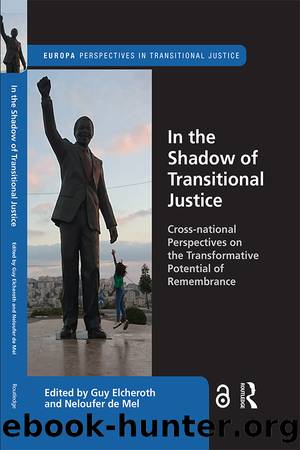In the Shadow of Transitional Justice: Cross-National Perspectives on the Transformative Potential of Remembrance by Guy Elcheroth & Neloufer de Mel

Author:Guy Elcheroth & Neloufer de Mel [Elcheroth, Guy & Mel, Neloufer de]
Language: eng
Format: epub
ISBN: 9780367765101
Google: Mu19zgEACAAJ
Goodreads: 58213726
Publisher: Routledge
Published: 2021-11-05T00:00:00+00:00
9 Rural women and their access to the law
Gendering the promise of post-war justice
Neloufer de Mel and Danushka Medawatte
DOI: 10.4324/9781003167280-12
Introduction
At the heart of Sri Lankaâs nearly three-decade-long civil war (1983â2009) between the Sri Lankan stateâs armed forces and the Liberation Tigers of Tamil Eelam (LTTE) over the formation of a separate state of Tamil Eelam, were women with a variety of experiences of the war. Some were combatants, administrative and nursing officers in the LTTEâs âBirds of Freedomâ womenâs military wing or the Sri Lanka armyâs Womenâs Corps. Others were part of the LTTEâs elite âBlack Tigerâ suicide squad. Numerically more significant, however, are the women of Tamil, Muslim and Sinhala ethnicity who survived, bearing the brunt of the war and its aftermath, as war widows, of whom there are an estimated 89,000 (Witting et al. 2016). In the former war zones of the north and east, many Tamil and Muslim women are also heads of households where livelihoods have been destroyed by the war (International Crisis Group 2017). They are also victim-survivors of conflict-related domestic and sexual violence, mothers, wives or sisters of family members who were forcibly disappeared, and caregivers to those disabled in the war if not disabled themselves. Women living in these areas as well as in the contiguous border villages also face multiple internal displacements â an estimated 80% of the displaced population were women (Satkunanathan 2018). The pervasive militarization of these areas has also meant restricted mobility and insecurity for women (de Mel 2017; Satkunanathan 2018). As a result of these experiences, women are also at the forefront of calls for transitional justice and accountability for war crimes, particularly in the north and east, through membership of associations such as Families of the Disappeared, Womenâs Action Network, Maatram, Affected Womenâs Forum, Suriya Womenâs Development Centre and the Trincomalee Womenâs Network, to name but a few.
Sri Lankaâs justice system has, by and large, failed these women. It is plagued with issues that deter them from accessing it freely. Distance to courts of law, poor public transportation particularly in rural areas, low levels of legal literacy and high legal costs obstruct access to justice in general for both men and women (Jayasundere and Valters 2014). Women face additional barriers, such as less access to information, greater restrictions to mobility and cultural attitudes that deter them from the judicial process (Jayasundere and Valters 2014). Inadequate gender mainstreaming within the law has resulted, moreover, in judicial bias against women (evident in the misogynist stereotypes contained in legislative enactments)1 and the consideration of women as unreliable witnesses in evidence procedures (Abeywardena 2016, pp. 37â44; Fonseka and Schulz 2018; de Mel and Samararatne 2017; Medawatte 2020; Centre for Equality and Justice 2018). These prejudices impact adversely on principles of equality and equity supposedly at the heart of the law. As such, they also have implications for the execution of transitional justice in Sri Lanka.
In relation to war-related harm, there have been only a few prosecutions to date, whether for conflict-related
Download
This site does not store any files on its server. We only index and link to content provided by other sites. Please contact the content providers to delete copyright contents if any and email us, we'll remove relevant links or contents immediately.
The Secret History by Donna Tartt(19052)
The Social Justice Warrior Handbook by Lisa De Pasquale(12187)
Thirteen Reasons Why by Jay Asher(8893)
This Is How You Lose Her by Junot Diaz(6877)
Weapons of Math Destruction by Cathy O'Neil(6265)
Zero to One by Peter Thiel(5786)
Beartown by Fredrik Backman(5737)
The Myth of the Strong Leader by Archie Brown(5499)
The Fire Next Time by James Baldwin(5431)
How Democracies Die by Steven Levitsky & Daniel Ziblatt(5215)
Promise Me, Dad by Joe Biden(5141)
Stone's Rules by Roger Stone(5081)
A Higher Loyalty: Truth, Lies, and Leadership by James Comey(4954)
100 Deadly Skills by Clint Emerson(4921)
Rise and Kill First by Ronen Bergman(4779)
Secrecy World by Jake Bernstein(4741)
The David Icke Guide to the Global Conspiracy (and how to end it) by David Icke(4707)
The Farm by Tom Rob Smith(4502)
The Doomsday Machine by Daniel Ellsberg(4484)
